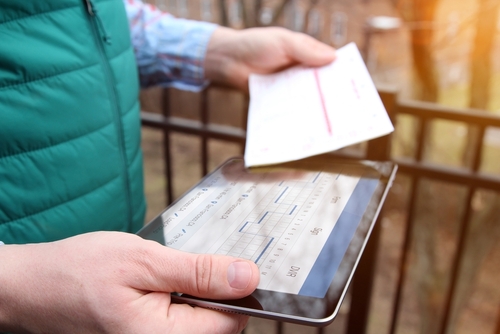The Government’s First Homes Scheme is set to be the first state-backed initiative to use digital property logbooks.
It comes after a year of planning between the Department for Levelling Up, Housing and Communities DLUHC) and the Residential Logbook Association (RLBA) and is one of the outcomes from a Government review of the early First Homes trials.
The scheme seeks to get up to 25% of any new development set aside for key workers and local first-time buyers who can access properties at a significant discount. The Government is targeting 15,000 First Homes purchases a year when the scheme rolls out.
DLUHC has been working with the RLBA over the last year to design the process where logbooks can be attached to all First Home properties.
The agreed process enables them to be set up when planning approval is given and be and populated with data from building developers. Under the proposed scheme, logbooks will be paid for by the developers who will take ownership of them at the same time as picking up the keys for their new home.
The First Home Logbooks are being configured to contain key information on eligibility criteria and constraints of the First Homes scheme. The logbooks will be provided centrally by the RLBA at the beginning of the development process and will be automatically lodged with the RLBA Register of Logbooks on completion. The registration of Logbooks for buyers and ensuring their transfer will follow the process that RLBA Logbooks currently follow with conveyancers issuing logbooks on completion.
A key function of the RLBA Register will be helping local authorities maintain the integrity of the First Homes Scheme once a property comes back on the market and is re-sold. The Register will monitor the status of developments and will be able to report on the progress of a property from the planning permission stage, through development, marketing and sale. Participating local authorities will receive reports and notifications via the RLBA Register.
RLBA spokesperson Simon Lumb, who is managing director of logbook company National Deeds Depository, said: “This first initiative is a significant first step in establishing logbooks for all properties in the UK.”
It comes as the RLBA joined the advisory board of a major pan-European project to investigate the role of the tools in delivering building standards across new build and retrofit.
The ‘DemoBlog’ project is funded by the European Union’s Horizon research programme.
It is a four-year initiative with participants from 15 countries but will focus on five demonstration products with the French CLÉA and the UK’s Chimni among them.
Nigel Walley, chair of the RLBA, said being part of the programme helped discover that logbooks are now compulsory in France, something he would like to see the UK follow.
For new-build, the logbooks - called a Carnet d’Information du Lodgement (CIL) - have to be supplied by developers.
They are required to contain construction information, a materials record, certification as well as operating, maintenance and servicing instructions for any equipment installed.
For retrofit, the logbooks have to be set up by a homeowner and contain certain permissions and certification.
Walley said: “It’s good to see an element of targeted mandation by the French Government. New-build and retrofit are two areas where we are exploring this for the UK.
“The one area where the UK is ahead is in registration and regulation. The RLBA’s Register of Logbooks, was one of the original requests to the RLBA by the Ministry of Housing to support the fight against property fraud.
“The European project partners have expressed a lot of interest in the role and value of the RLBA Register of Logbooks in the UK and our self-regulatory process. There is no equivalent in Europe yet, but we have been asked to demo the register to the French Govt who are now considering one.”
















.png)


.png)



Join the conversation
Be the first to comment (please use the comment box below)
Please login to comment